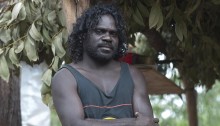 The Molly Reynolds’ directed film, Another Country, is a difficult work to define. Guided by the cool, calm, and soothing narration of indigenous actor, David Gulpilil, we are sent on an almost structure-free wander through Gulpilil’s home town, Ramingining. I say almost, because both he and Reynolds have a very clear purpose in mind – to detail the often-misunderstood nuances of aboriginal culture, and reveal the consequences of such misunderstandings when they are translated into government interventionist policies.
The Molly Reynolds’ directed film, Another Country, is a difficult work to define. Guided by the cool, calm, and soothing narration of indigenous actor, David Gulpilil, we are sent on an almost structure-free wander through Gulpilil’s home town, Ramingining. I say almost, because both he and Reynolds have a very clear purpose in mind – to detail the often-misunderstood nuances of aboriginal culture, and reveal the consequences of such misunderstandings when they are translated into government interventionist policies.
But perhaps I’m getting ahead of myself. For those who may not be in the know, it is probably worth mentioning that Gulpilil is Australia’s most well renowned indigenous film star (unfortunately, there aren’t enough of them). He made his screen debut in Nicolas Roeg’s Walkabout (1971). He co-starred with Dennis Hopper in Mad Dog Morgan (1976), the tale of one of Australia’s more infamous bushrangers. And he had significant roles in Peter Weir’s The Last Wave (1977) Crocodile Dundee (1986), Wim Wender’s Until the End of the World (1991), Phillip Noyce’s Rabbit Proof Fence (2002), John Hillcoat’s The Proposition (2005) and Baz Luhrman’s Australia (2008) amongst other films.
But problematically, despite Gulpilil’s fame, many of the films he has appeared in have been centred around interpretations of indigenous culture as written by non-indigenous people with a limited conception of these cultures (there are exceptions). Another Country is one of several films developed collaboratively by Rolf de Heer, Molly Reynolds and David Gulpilil aimed at redressing this issue in recent years (including The Tracker, Ten Canoes, and Charlie’s Country), and it is easily the most experimental.
Gulpilil’s background makes him the perfect bridge between indigenous and “white fella culture”, a point that he makes clear from the beginning of the film as he lists off the various celebrities with whom he has interacted (Hendrix, Bob Marley and the Queen make the list) before also making the point that he has spent most of his time far removed from all this glitz and glamour amongst his own people in Northern Australia, the Yolngu of Ramingining.
Which is where, for Another Country’s duration, Gulpilil invites us to spend much of our own time. He guides us through this community, showing the impact of successive generations of government policies (some more well-intentioned than others, but most built on fundamental misconceptions about the culture on which they are imposed). These policies include everything from the oblivious attempt to herd disparate aboriginal groups with different languages and cultures into singular populations; imposing ideas around wealth generation on communal cultures that traditionally distribute wealth amongst members; reactionary approaches to social issues that create entirely new problems; and implicitly, the ongoing consequences of the Stolen Generation. But during all of this, what is most striking is Gulpilil’s hopeful tone, and lack of bile:
“We can’t get there if you think you know more about us than we do. You have to try and understand us. Listen to our history. Listen to us.“
The film is a simple, concise, unadorned, and important request to reconsider the relationship between Australia’s indigenous and migrant populations.

Comments
13 responses to “Another Country: David Gulpilil Explains Indigenous Culture”
[…] Soon enough, Morgan is shot in the act of a crime, but saved from death by a young indigenous man (David Gulpilil) who nurses him back to health. Billy is also an outcast from his own tribe (and more importantly […]
I don’t know much about cultural relations in Australia, but this looks like a brave and timely film. Thanks for this great review James.
Certainly worth a view if you come across it. Thanks, Ed 🙂
I saw the film, very interesting and the confusion and cultures in clash mode, both indigenous and white fella showing their faults and short comings along with good intentions. As Davids character tried to switch back to his cultural hunting but that falls short due to fears that the spear could be used as a weapon… Too much history gets in the way, what do our indigenous brothers want? They enjoy their share of the white fellas ways and hand outs to just go on a cultural and permanent walkabout. We are all lost for the answers.
Hey Rob! Sounds like you might be talking about Charlie’s Country? That’s another great Gulpilil film!
Sounds like a very intriguing movie, James. I really enjoyed seeing Rolley Mintuma in Tracks last year. Made me remember that authenticity really has value. Gulpilil would seem to bring a great deal of authenticity to whatever he tackles.
He certainly does. I was lucky enough to see him talk at a Q&A afterwards, and Gulpilil is quite an impressive human being.
Excellent article on a terrific actor, James. This looks like an interesting film; I wish Gulpilil was more well known here in the United States–he has excellent range and can move from comedy to drama seamlessly. That’s not easy to do. 😀
Thanks, Simon! Agreed on all counts 🙂
Fantastic review. Excited to call up this one, but disappointed Itunes doesn’t have it. On a search…
Thanks!
Thanks 🙂 might be a bit hard to find right now, I just recently saw it at the premiere. Hopefully it will get a wider release soon!
I have always enjoyed his performances, James, and it looks like he is the perfect person to bring some understanding of his culture into the mainstream. First-rate review mate.
Best wishes, Pete.
Thanks, Pete. Definitely worth a look if you come across it 🙂